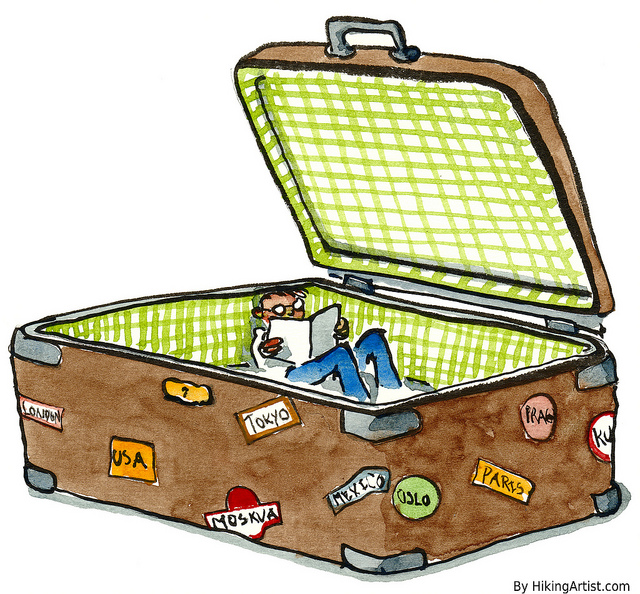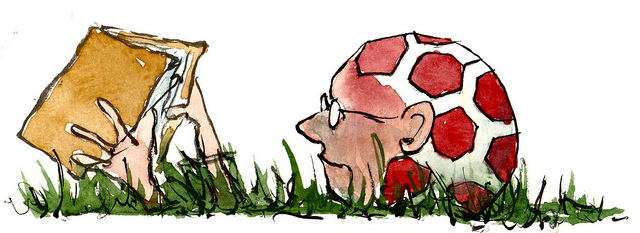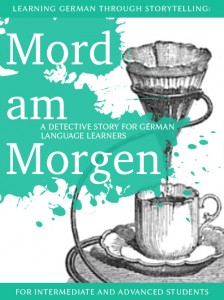
German seems to be very popular, these days. Whether it’s the obnoxious “How German sounds compared to other languages” meme (it should actually be called: How German sounds when you are shouting) or the raving popularity of the Nein Quarterly, German seems to be in vogue. And yet, as Adam Fletcher pointed out: “Every foreigner wants to know German. Unfortunately, no-one wants to learn German.”
German has the reputation of being a harsh and difficult language. It’s true that it’s not always easy for beginners (especially for native English speakers) to wrap their head around Wechselpräpositionen, Wortstellung, and other grammatical phenomena which don’t have an equivalent in the learner’s mother tongue.
However, as I mentioned earlier: Since “grammar alone does not a language make” there are other ways to unlock the treasure trove of the German language. One of my favorite approaches of teaching German is offering people to learn German with stories.
Stories can draw a learner into the language and boost memorization of words and phrases. A good story encourages students not to be distracted by surface features of a language but to dive deeper and get a feel for structure, flow and wordbuilding.
1. Tickling your Fancy
First and foremost, go and find some stories that you are interested in. It may sound obvious, but reading texts that you aren’t interested in won’t do much good, it can even harm the learning process. This is why, before even choosing a story based on its difficulty level, pick something that tickles your fancy!
Where To Find Materials To Learn German With Stories
If you have a Kindle reader you can take a look at my article on how to get free German ebooks on your Kindle, both classic literature and contemporary writing. Since these books are all written for native German speakers, take a look at the first few pages before downloading something. If it seems too difficult, keep on browsing. Hint: The books in the children’s and youth category may use less complicated vocabulary and easier sentence structures.
If even these prove to be too difficult you can also take a look at my own German learning stories, which are designed as a stepping stone to authentic German literature, and come with integrated vocabulary and comprehension questions.
2. Start Your Reading Engines
Okay, so you’ve found a book or a story with an interesting subject. What next? There are a few strategies how to learn German with stories and get the most out of it.
First of all, prepare yourself for the unknown. This also may sound obvious, but it’s important to acknowledge that you are inevitably going to stumble over difficult words, expressions and sentence constructions. It’s going to happen, no matter what. The only question is how you’ll deal with it.
Depending on the individual some approaches work better than others when you learn German with stories. Don’t take the following as fixed advice. These are mere pointers for your consideration:

Let The River Flow
The most important part when you learn German with stories is to establish some kind of Lesefluss (reading flow). You might be reading quickly or slowly, it doesn’t matter — as long as you keep reading. As mentioned before, there will be difficult words. Learn to let them be for now. I’ll talk about translation methods further down.
Don’t stop too long at every unknown or strange word, trying to figure it out. It’s okay not to know. Just keep on reading, flowing steadily, like a river unperturbed by obstacles — just moving on.
You’ll find that some of the unknown bits clarify themselves by continuing to read. You might not be able to translate them into your own language, but you’ll get more or less solid ideas for what they might mean. When you learn German with stories you can glean meaning from the text itself simply through reading flow and context. Sounds impossible? This is how human beings learn language in the first place. We might not be as good at it as infants, but if we can learn to let the unknown just be, many things reveal themselves.
Translation: Use It Like A Spice
However, sometimes the same strange word or expression will keep popping up on page after page. You understand that it’s a key vocabulary to make sense of the story and there’s no use going on without it.
If you’re reading stories on an ereader or tablet, you can get instant translations by clicking/tapping on the word. I’ve become so fond of this simple trick that I often catch myself trying to tap the page of paper books these days — to no avail. This can be great support when you want learn German with stories.
Through these integrated dictionaries you can get instant word translations, without significantly interrupting your reading flow. Should you find yourself looking up every second word, the text might be too difficult or you’ll just have to work on your flow.
If you want to find out how to get translations on your Kindle device take a look here, iPad and iPhone readers check this out.
For readers who don’t have these devices, I recommend the dict.cc German-English dictionary. I can’t speak for other languages, but for German-English it’s just excellent and even lists many idioms and variations.
Building Your Own Dictionary
Last but not least, to further memorize new words, you might want to create a list of the words you translated, so that whenever you learn German with stories you grow your own dictionary. Again, it doesn’t make sense to overdo this, because noting down every second word will break the flow and you’ll be unable to really get into the story.
Some words you’ll remember just by reading. Others you’ll translate once and remember immediately. Wordlists can be very powerful to help memorize words that you keep forgetting. While the mere process of writing them down helps already, you can also use these lists for further practice.
A very simple and straightfoward way is to create virtual flashcards from your word lists. By using a tool like Quizlet you can create a set of words for practice. The cool thing about Quizlet is that it has integrated audio, which is surprisingly good for German, so you’ll not only learn the words’ meaning but also their pronunciation.
TL;DR
In short, if you want to learn German with stories, first find something interesting to read. Then try to get into the flow of the story, translate some words, but not all words, and start building word lists for further study.
Do you learn German with stories? What has been your experience so far? Which tools do you use? Share your thoughts in the comments below!
–
illustrations: HikingArtist.com

